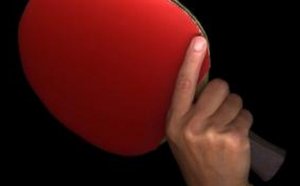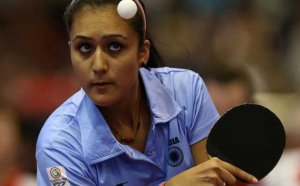
Terms of Table Tennis
| Anti or
Anti-loop or Anti-spin |
A smooth rubber with very low surface friction, used to defend against excessive spin or to confuse the opponent. This type of rubber deactivates spin and speed, returning a "dead" ball. |
| Assistant Umpire | The person appointed to assist the umpire with certain decisions. |
|
^ ^ |
|
| Backhand | A shot executed where the back of your hand is pointing towards the opponent, to the left of the elbow for a right handed player and vice versa for a left handed player. |
| Backspin | A type of spin used mostly on defensive shots. When you chop down on the ball, you produce backspin. The bottom of the ball will move away from you. |
| Bat | An alternative name for the racket. |
| Blade | The wooden part of the racket. |
| Block | A topspin shot played close to the table with the racket making contact with the ball just after it bounces. |
| Blocker | A style of play where use of the block is the primary stroke. |
| Chop | A defensive return of a topspin stroke played with backspin, usually well away from the table. |
| Chopper | A style of play where use of the chop is the primary stroke. |
| Chop Block | A stroke played close to the table where the racket makes contact with the ball (just after it bounces) with a fast downward vertical motion to create backspin. Made popular by Jan-Ove Waldner. |
| Closed Racket | A stroke played with the striking surface of the racket angled downwards, eg. a topspin stroke or block. |
| Counter-loop | A loop stroke played in response to a loop stroke from your opponent. |
| Counter-smash | A smash stroke played in response to a smash stroke from your opponent. |
| Cross-court | A stroke that's hit diagonally from corner to corner. |
| Crossover Point | The area in which the player has no obvious choice of forehand or backhand. For a right handed player, the crossover point is roughly in line with the right hip. |
| Dead ball | A stroke played which returns the ball with very little, or no spin. |
| Deep | Playing any shot which causes the ball to bounce very near to your opponents end of the table. |
| Double Bounce | When the ball bounces twice on one side of the table before a return is made, causing that player to lose the point. |
| Doubles | A game of table tennis where two people play on each side and alternate turns at striking the ball. |
| Down the line | A stroke that's played where the ball travels parallel to the sidelines of the table. |
| Drive | A stroke played close to the table with your racket arm moving forward and slightly upwards in the direction that the ball is going to travel. |
| Drop shot | A shot which drops very short over the net on your opponent's side of the table. Usually played when your opponent is positioned away from the table. |
| Early | Playing a stroke (during a rally) that makes contact with the ball just after it bounces. |
| Expedite | A rule which comes into operation if a game is unfinished after 10 minutes play (or at any earlier time at the request of both players or pairs). Thereafter, each player shall serve for 1 point in turn and if the receiving player or pair makes 13 returns, the receiver shall score a point. |
| Flat | Playing a stroke with minimum topspin so that the ball travels very low over the net. |
| Flick or
Flip |
A stroke played close to the table where you hit over the back or top of ball, using a loose wrist action to impart topspin. |
| Float | A stroke played which returns the ball with very little, or no spin. Particularly used by players who use a defensive style of play in order to deceive their opponent. |
| Forehand | A shot executed where the palm of your hand is facing your opponent, to the right side of the elbow for a right handed player and vice versa for a left handed player. |
| Free Hand | The hand not holding the racket. |
| Funny Rubbers or
Funny Bat / Racket |
See Long Pimples |
| Game | A game is won by the player or pair first scoring 11 points unless both players or pairs score 10 points, when a game shall be won by the first player or pair subsequently gaining a lead of 2 points. |
| Gluing-up | The act of affixing table tennis rubbers to the blade with table tennis glue (particularly with "speed" glue which was repeated at regular intervals in order to increase the playing speed of the rubber, but this is no longer permitted). |
| Handicap Event | An event in a tournament where players are graded or ranked according to ability so that they can compete equally. The weaker player will not have to score as many points as the stronger player to win a game. |
| Heavy | Used to describe excessive spin. |
| High Toss Serve | A serve where the ball is thrown high into the air. This helps the server to increase the amount of spin and speed imparted onto the ball. |
| ITTF | International Table Tennis Federation - the international governing body for the sport of table tennis. |
| Inverted rubber | The most common racket covering. It consists of a sheet of rubber on top of a layer of sponge. The pimples (pips) point inward, so the playing surface is smooth. |
|
^... |
Source: www.allabouttabletennis.com
RELATED VIDEO
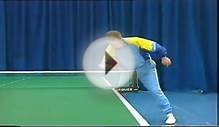
How To Choose Your Table Tennis Rubber
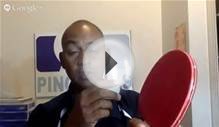
Ask The Coach Show #88 - Table Tennis Terminology
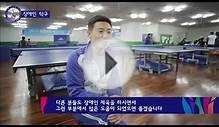
Table Tennis for disabled - Interview of Incheon Para ...
Share this Post
Related posts
Benefits of Table Tennis
FEBRUARY 05, 2025
Whether you’re playing doubles or singles, table tennis, or ping pong, can be a fast-paced competitive sport. In fact, when…
Read MoreFamous players of Table Tennis
FEBRUARY 05, 2025
William Henzell, Australia William Henzell is a fast playing Australian, originally from Adelaide. William has represented…
Read More
